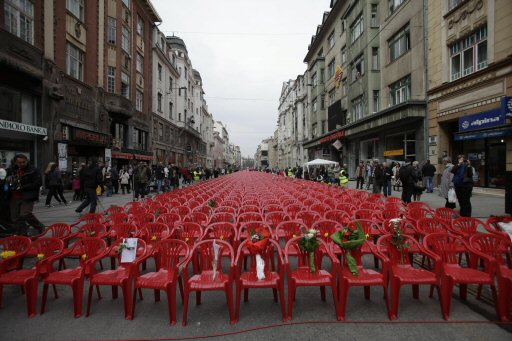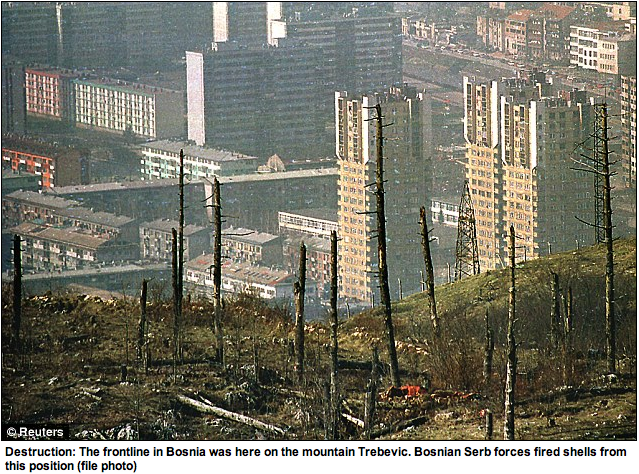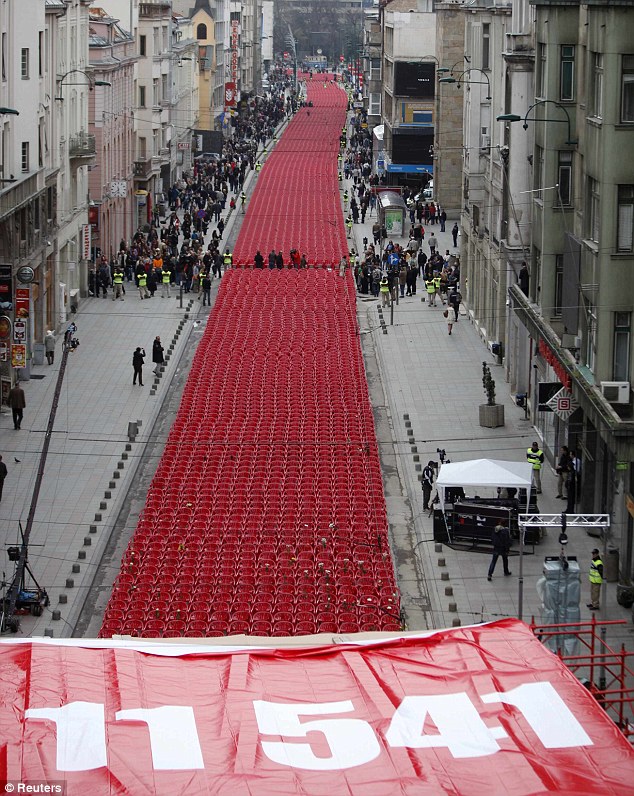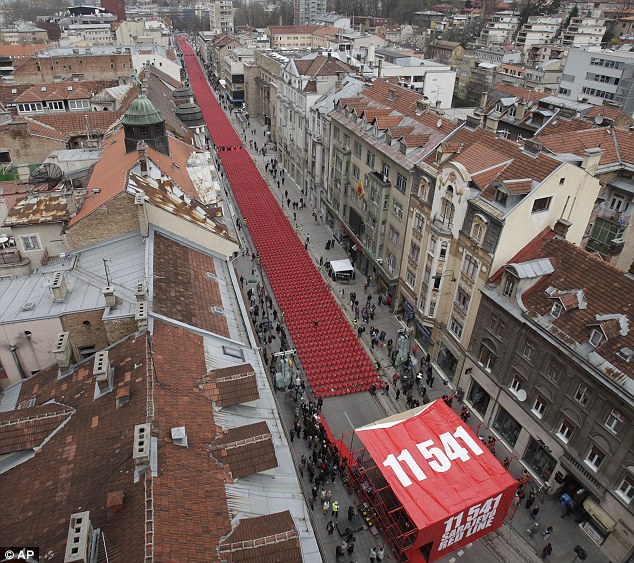Empty chairs were laid out in Sarajevo today in honour of the 11,541 people killed in the city during the Bosnian war which began exactly 20 years ago. The seats - lined up along the city’s main street - were left empty in memory of the victims of the 44-month Serb siege of the city. Hundreds of the chairs are small representing the children slain in the conflict.
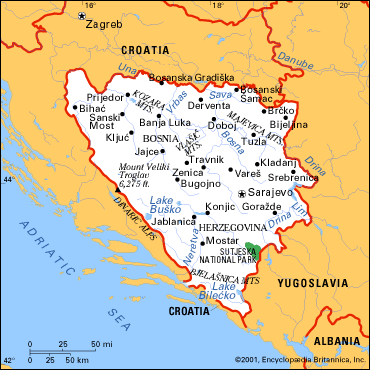 It was 1994, and I was heading to Kosovo. The war in Bosnia was, at least in theory, winding down, and it was supposed to be safe for me to travel to and through the countries that once comprised the former Yugoslavia. I’d done my research, and I knew that I was heading into an area of Eastern Europe that was at best unstable and at worst…well, I chose not to think about that. It wasn’t the first war zone I’d lived and worked in, and I was confident (read: living in serious denial) that I could handle myself.
It was 1994, and I was heading to Kosovo. The war in Bosnia was, at least in theory, winding down, and it was supposed to be safe for me to travel to and through the countries that once comprised the former Yugoslavia. I’d done my research, and I knew that I was heading into an area of Eastern Europe that was at best unstable and at worst…well, I chose not to think about that. It wasn’t the first war zone I’d lived and worked in, and I was confident (read: living in serious denial) that I could handle myself.
The day before I was scheduled to fly to Zagreb, Croatia, a Serb mortar emplacement in the hills above Sarajevo dropped a mortar shell into the crowded Markale market in central Sarajevo. Sixty-eight people were killed and 144 injured. It was one of the worst incidences of savagery in a siege characterized by a long-running parade of savagery. Even I, who tended to soft-pedal those sorts of obvious personal risks, had to consider the realities of where I was heading. No, I wasn’t going to Bosnia, but Serbia, Crotia, and Kosovo weren’t exactly the City of Brotherly Love.
I left as scheduled, but I found myself stuck in Zagreb for a month before the State Department would allow me to travel into Kosovo. Getting to Pristina, Kosovo, my final destination, meant flying from Zagreb to Skopje, Macedonia, and traveling by taxi into Kosovo. This meant having to pass through a Serb border control post before being allowed to enter Kosovo. After the massacre in Sarajevo, it was easy to be apprehensive about my prospects and, to a lesser degree, my safety. Somehow I never managed to connect the savagery in Sarajevo in particular and Bosnia in general to what it might mean to my safety traveling alone and unarmed in the region. That willful ignorance would come in handy over the next few months. I never allowed myself to think about whether I was in any danger, and, if so, how much. I just didn’t think about it, and so I seldom felt myself at risk. Whether out of a sense of adventure or abject stupidity, I did what I needed to do without coming to grips with the risks involved.
I was never allowed to travel into Bosnia, of course. It was simply too dangerous at that time, and though I would have gone if allowed, I understood that discretion was the better part of valor. Traveling into a ear zone full of Serb paramilitaries was something even I had to admit was unwise.
I lived and worked about 150 miles from Sarajevo. Thankfully, that was a close as I got to the madness. Despite some hairy situations, I don’t believe my safety was ever seriously threatened. I never had to worry about snipers taking me out as I walked across a street or shopped in an outdoor market. I never had to worry about death arriving silently, anonymously, and with a cruel randomness that became the rhythm of life in Sarajevo.
I played soccer in college with a friend who was a runner for ABC Sports at the 1984 Olympic Winter Games in Sarajevo. He told me stories about what a lively and friendly place the city was, how no one worried about whether someone was Serb, Croat, or Muslim. The appearances, of course, belied the reality that lay just beneath the placid surface. All it took was the spark of hatred that would engulf Sarajevo and the rest of Bosnia into years of madness and murder. The breakup of Yugoslavia provided the ignition source, and over 43 months, 11,541 Sarajevans, including 600 children were killed. I could try to explain the reasons behind the siege of Sarajevo, but there’s really no way to make sense of the madness.
SARAJEVO — With row upon row of empty red chairs, one for each of the 11,541 victims of the siege of Sarajevo, Bosnia on Friday remembered when war broke out 20 years ago and the West dithered in the face of the worst atrocities in Europe since World War Two.
The anniversary finds the Balkan country deeply divided, with power shared uneasily between Serbs, Croats and Muslims in an unwieldy state ruled by ethnic quotas. It languishes behind ex-Yugoslav neighbors on the long road to the European Union….
Some 100,000 people died and 2 million people were forced from their homes as Bosnia gave the lexicon of war the term “ethnic cleansing”. Slow-motion intervention eventually brought peace, but at the cost of ethnic segregation.
Underscoring the disunity, Bosnia’s autonomous Serb Republic ignored Friday’s solemn remembrance of the day shots fired on peace protesters in downtown Sarajevo marked the start of the war.
In a blood-red symbol of loss, empty chairs stretched 800 meters down the central Sarajevo street named after socialist Yugoslavia’s creator and ruler for 35 years, Josip Broz Tito.
Smaller chairs represented the more than 600 children killed in the 43-month siege by Serb forces that held the hilltops. Thousands of people gathered for a concert in remembrance with a choir of 750 Sarajevo schoolchildren.
Sarajevo today is nowhere near the cosmopolitan city it was prior to the siege, but at least the people of Sarajevo are trying to heal and put the war behind them as best they can.
For those who after the end of World War II said, “Never again….”, Sarajevo is living proof that “never” isn’t quite what it used to be. And Sarajevo was hardly the only city in Bosnia to suffer from the savagery of Serb paramilitaries who lived to kill Muslims, just the largest and most visible to the world.
While in Belgrade, Serbia, I ran across a Serb reservist who told me about Serbs who would go into Bosnia on the weekends to “go hunting”…only they weren’t hunting wild game. They were hunting Muslims.
Eighteen years later, and it’s difficult not to think about that period of my life without feeling a tremendous sadness. I grew up in a place where my idea of violence was a snowball fight…and there I was, standing on the Knez Mihailo in Belgrade, trying to process the idea of hunting human beings like wild animals simply because of their religion.
The more I tried to understand it then, the less I understood it. That’s every bit as true today.
